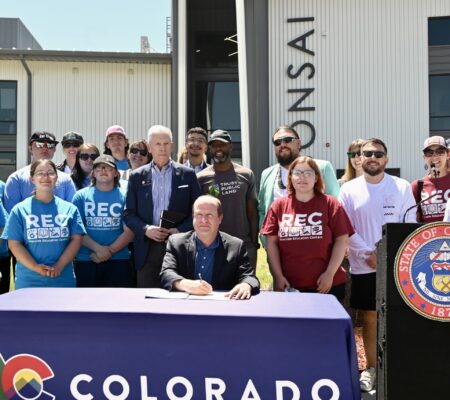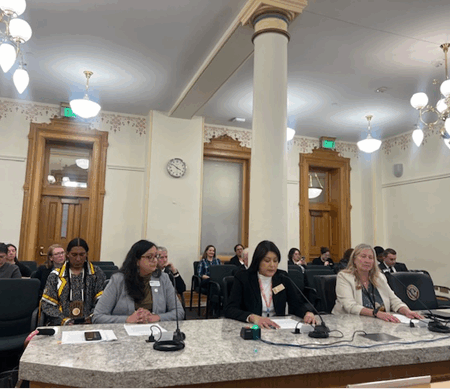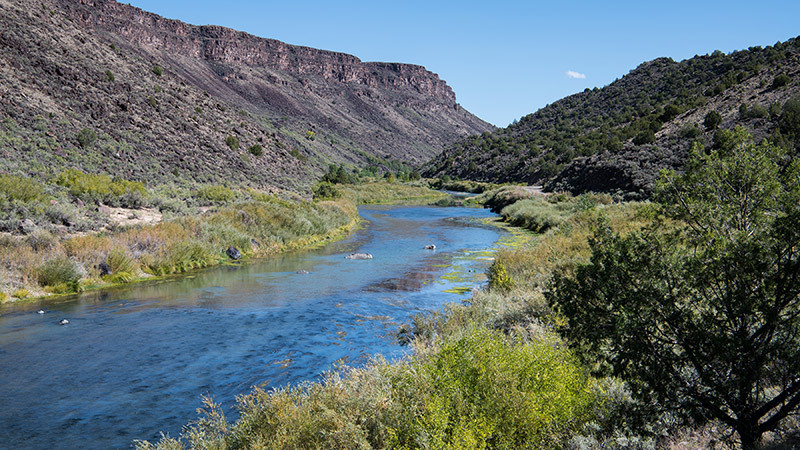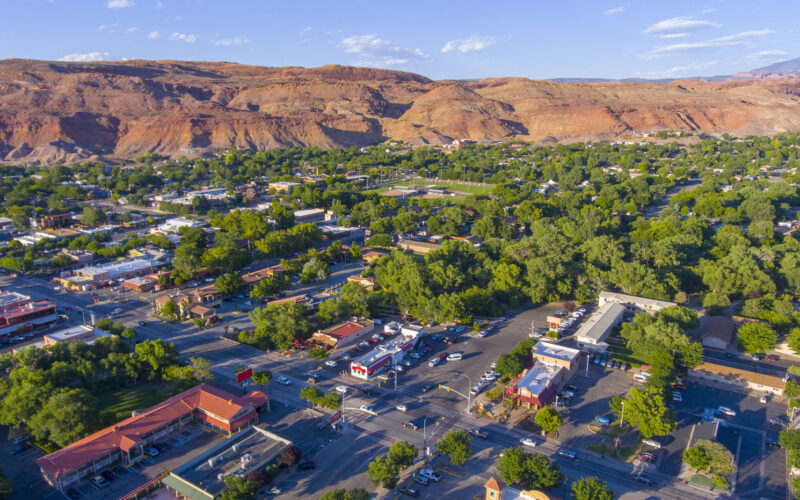July 7, 2025
The dramatic shift in national priorities underscores the urgent need for effective, state-level climate action. States are critical in driving climate policy, with state, regional, and local efforts accounting for about 70% of U.S. emissions reduction commitments, according to the Rhodium Group.
That’s why WRA is focused on advancing durable policies adapted for each state’s unique environment, culture, and needs. In the 2025 session, we saw major wins – from protecting ratepayers and conserving water, to reducing wildfire risks and promoting equitable outdoor access.
Arizona | Colorado | Nevada | New Mexico | Utah

Arizona
Defending Against Harmful Energy Policies
Sometimes the best offense in state legislatures is aggressive defense. WRA works tirelessly behind the scenes to make sure that harmful bills either don’t make it to the Governor’s desk or are dead on arrival. This session in Arizona, WRA played defense on potentially harmful energy policies and successfully defeated several bills trying to undermine wind energy. One such bill would have required that wind projects be set back six miles from the nearest property line. If passed, the bill would stand as the most restrictive law limiting wind power development in the nation and would have effectively killed wind energy development in the state. WRA also helped secure the veto of a bill that would have added unnecessary complications to the state’s integrated resource planning process and made it more difficult for Arizona utilities to add renewable energy sources.

Colorado
Increasing Outdoor Access
In Colorado this year, WRA worked on several bills that focused on increasing outdoor equitable access and securing better conservation on state lands.
WRA testified at the legislature in support of House Bill 25-1163 in partnership with the Colorado Department of Natural Resources and Colorado Parks and Wildlife. HB 25-1163 allows enrolled members of the Southern Ute Indian Tribe and Ute Mountain Ute Tribe to enter state parks without paying an entrance fee. This legislation is the culmination of relationship building between the Colorado Parks and Wildlife and the two Tribes and will help to restore ancestral connections to the lands, increase outdoor access for Tribal members, and address historic injustices and barriers.
Similarly, WRA played a large role in increasing funding for Colorado’s Outdoor Equity Grant Program through developing and adapting the policy, leading coalition work, and encouraging advocacy from our supporters. House Bill 25-1215 increases the amount of money to the grant program which allocates those funds to outdoor education and recreation programs for youth and families who have historically lacked access to nature. In just three short years since its inception in 2021, the grant program has become wildly successful, supporting organizations that have served over 65,000 youth in 51 of the state’s 64 counties. So successful, in 2024 alone, the program received $21 million in requests for its $3 million funds.
The Outdoor Equity Grant Program is a key tool to promote connection to nature and a conservation ethic among the next generation, enhance and sustain the state’s outdoor recreation economy, and secure lasting mental and physical health improvements and educational outcomes for youth. By successfully increasing funding, we’re creating the next generation of environmental advocates and helping the West reach its full potential.


Protecting Colorado Lands from Fire and Improving Conservation Outcomes
Each summer, the threat of catastrophic wildfire looms in Coloradans’ minds as an ever-present reality. At WRA, we know that safe and controlled prescribed fire can dramatically reduce the risk of these extreme fires, but many qualified burners fear the repercussions and liability of potential damage from these burns. Because of this, WRA led the passage of Senate Bill 25-007 – establishing a $250,000 prescribed fire liability claims fund for potential damages from safely managed prescribed burns
This bill addresses one of the primary hurdles preventing trained, qualified burn bosses in Colorado from using prescribed fire by providing a layer of protection against potential exposure to liability. WRA was instrumental in the development, advocacy, and strategy of this bill from the summer of 2024 to its passage in May 2025.
WRA was also instrumental this session in improving conservation outcomes on state trust lands. In Colorado, the State Land Board holds 2.8 million acres of land in trust for public schools and other public beneficiaries. The Land Board is the second largest landowner in the state behind the federal government. Thirty years ago, Colorado voters amended the state constitution to deliver a dual mandate to the State Land Board to both generate reasonable and consistent income over time while providing for sound stewardship of all state trust lands, including protecting Colorado’s natural areas for future generations. This mandate, however, has not always been in the forefront of the work on state trust lands. WRA helped craft and testify in support of House Bill 25-1332, which creates a work group to examine the use of state trust lands and deliver recommendations on how to improve conservation, recreation, and agricultural outcomes while diversifying revenue streams to benefit the lands’ beneficiaries like public schools.
Conserving Water in Colorado’s Businesses and Homes
One of the ways that WRA has seen real, on-the-ground impacts for water conservation is through mitigating unnecessary water use in new developments. About 50% of municipal water is used outdoors, and much of that is used to water thirsty turfgrass. But a lot of that turfgrass is “nonfunctional” – grass that is only walked on when mowed. It doesn’t make sense to pour our valuable water on thirsty grass that is rarely used. Because of this, WRA has been working to address the water impacts of nonfunctional turf – most recently through the bipartisan passage of House Bill 25-1113.
Colorado communities have already put a lot of effort into saving water by replacing nonfunctional turfgrass with waterwise landscaping. HB 25-1113 supports these efforts by building on the progress we’ve already made.
This new law prohibits the installation of nonfunctional turf, artificial turf, and invasive plants in new apartments and new condominium housing. Communities would also need to limit high water use turf, like Kentucky bluegrass, in new single-family residences if they have not already done so. Each community would be able to decide how they would like to implement these requirements so that they can create standards that work for their unique situation. This legislation will help save water and build resilience while giving communities the flexibility they need to adopt landscaping standards that work for them. We know that moving forward we need to save water wherever we can, and HB 25-1113 is a win-win situation.

Nevada
Protecting Consumers’ Energy Costs
In the 2025 Nevada legislative session, WRA was hard at work protecting the wallets and health of everyday Nevadans. With WRA’s support from conception to passage, the legislature passed Assembly Bill 452 that made some major improvements at the Public Utilities Commission of Nevada. This includes exploring the benefits of fuel cost-sharing mechanisms that could require utilities to share the cost of fluctuations in fuel prices, rather than customers bearing them alone, thus incentivizing investment in lower cost, more stable fuel options. AB 452 also makes sure that consumers who are overcharged by their utility receive full refunds.
WRA also heavily supported Assembly Bill 46, making sure that utilities are disclosing critical information needed by stakeholders during the ratemaking process to protect consumers. We also worked to lessen the negative impacts of another bill, Senate Bill 417, by adding critical amendments that protect Nevada ratepayers. SB 417 makes it very unappealing for gas utilities to add formula ratemaking — a predefined formula for deciding energy rates rather than rate cases that engage stakeholders and provide more oversight. It provides guardrails that will protect Nevadans from potential price hikes.
Increasing Outdoor Education and Recreation
This session the Nevada Legislature unanimously passed Assembly Bill 108. The bill allocates $500,000 to the Nevada Outdoor Education and Recreation Grant Program, which provides funding to organizations across the state that offer outdoor experiences to kids and teens. WRA has been a strong advocate for this program, engaging with legislative leadership in both the Assembly and Senate to emphasize the importance of outdoor education for Nevada’s youth.
The grant program makes it easier for youth to get into nature by funding education and recreation programs for those who may otherwise face barriers to accessing the outdoors. The program:
- Promotes connection to nature and a conservation ethic among the next generation
- Enhances and sustains the state’s outdoor recreation economy
- Secures lasting mental and physical health improvements and educational outcomes for our state’s youth
This is Nevada’s only state-level program supporting access to nature, and demand for funding has far exceeded available dollars. Funded with a one-time investment of $500,000 in 2023, 116 qualified programs applied for over $2.5 million in funding, but the state was only able to support 44 grantees. That’s just 38% of qualified applicants. Assembly Bill 108 helps sustain this critical program so more kids and teens can experience the transformative powers of nature.

New Mexico
Modernizing New Mexico’s Wildlife Management
Senate Bill 5, modernizing New Mexico’s wildlife management, was one of WRA’s top priorities in 2025 and, after years of advocacy, was also one of our biggest wins this session. New Mexico is one of the five most biodiverse states in the nation, and New Mexicans both cherish their wildlife and rely upon it for a stable food supply. Unfortunately, despite the good work of its staff, the New Mexico Department of Game and Fish was operating under an outdated wildlife management system, leaving many species vulnerable to worsening wildfire, flooding, and drought. That’s why WRA, in partnership with a diverse coalition of hunters and anglers, conservationists, animal rights groups, and good government advocates, worked to pass SB 5 that creates a 21st century wildlife management system.
SB 5 updates the Department of Game and Fish’s name to the New Mexico Department of Wildlife and gives it clear legislative authority to manage most wildlife in the state and the environmental challenges they face. SB 5 also makes major reforms to the New Mexico State Game Commission that has been in disarray and overly politicized for years. This new law creates a bipartisan nominating committee to select strong candidates but leaves appointment power with the governor. This will balance rural and urban interests, ensuring the unique voices of farmers, ranchers, hunters, anglers, biologists, Tribes, and wildlife conservationists are all represented.
Finally, SB 5 mitigates a long-term funding problem for the department. By modestly increasing hunting and fishing licenses — widely supported by sportsmen’s groups — the bill creates a new, sustainable funding source that ensures healthy populations for game, fish, and other wildlife for future generations. It also adds a $10.5 million investment from the Government Results and Opportunities Fund to protect at-risk native species from ending up on the federal threatened or endangered species list. If the Department can successfully protect these identified species over the next three years, this funding may become a recurring part of its budget.
The effort to reform New Mexico’s Department of Game and Fish and State Game Commission is years in the making. And now New Mexicans will have an effective wildlife agency that meets the needs of hunters, anglers, recreators, and communities while preserving the state’s natural heritage and way of life.


Keeping New Mexico Rivers Flowing
New Mexico water can’t wait. New Mexico is expecting a 25% reduction in streamflow over the next 50 years. Meeting the state’s water needs is only getting harder, and rivers are feeling the strain. Fortunately, the state has a tool that can help protect our rivers, and this session WRA was able to help it get the resources it needs. Created 20 years ago, the Strategic Water Reserve allows the state to buy, lease, or accept donated water and keep that water in rivers for the benefit of New Mexicans and the environment. The Strategic Water Reserve allows the state to incentivize water conservation, prevent water shortages, protect wildlife, and avoid litigation. But it has been chronically underfunded, and program limitations kept it from reaching its full potential.
This session, by passing Senate Bill 37, New Mexico created consistent, dedicated funding that can see through the complex and lengthy process of buying or leasing water. The bill also allows the Reserve to acquire water that protects groundwater supplies and increases stream flows — supporting healthy bosques and replenishes groundwater to help sustain our communities in a drying climate.
Finally, SB 37 prioritizes projects that serve multiple purposes at once as the state reviews which water rights to acquire. When we leave water in rivers, it benefits both the environment and outdoor recreation activities like fishing, boating, and swimming. By allowing the Interstate Stream Commission to consider supplementary benefits, like recreation and cultural uses, we can ensure our communities get the most out of every drop of water we keep in our rivers.
Another major win for New Mexico rivers that WRA supported came from Senate Bill 21. SB 21 empowers the New Mexico Environment Department to protect New Mexico waters from existing and future pollution. In 2021, the Sackett vs. EPA Supreme Court decision stripped protections under the Clean Water Act from many New Mexico wetlands, rivers, and streams that don’t run year-round — protections these waters enjoyed for nearly 50 years. Following this rollback, up to 95% of the state’s streams lost protections, and American Rivers named all New Mexico’s rivers in its list of the most endangered rivers in the country. Before passing SB 21, New Mexico was one of only three states that left surface water permitting up to the federal government. By passing this new law, the state brought water oversight to the state level, reinstating critical protections that had existed for decades, and taking over permitting for the surface waters that are still federally protected.
Funding for Clean Energy and Climate Action
WRA played a key role this session in expanding funding for clean energy and climate action across the state of New Mexico. By supporting Senate Bill 48, “Community Benefit Fund,” and Senate Bill 83, “Innovation in State Government Fund,” WRA helped New Mexico invest $210 million in local government climate projects and $10 million for climate projects across state agencies.
The Community Benefit Fund diversifies New Mexico’s economy, enhances energy infrastructure, and invests in local communities. The bill will allocate money to New Mexico state agencies to grow industries that don’t rely on oil and gas and invest in community energy efficiency, clean energy technology, and transportation electrification efforts in schools. This fund will also transfer money to update New Mexico’s electric grid, making it cleaner and more reliable, and invest even more funding to protect the state’s natural spaces.
Similarly, the Innovation in State Government Fund focuses on smarter planning for the future to fight climate change through green jobs, clean energy, and a healthier environment for all New Mexicans. The fund will support projects that reduce emissions, create new green jobs across the state, boost clean energy sources, and align state planning to effectively implement sustainable policies. The fund also invests in technical assistance for local communities for climate action and promotes economic diversification.

Utah
Securing Clean Truck Incentive Funding
After two years of work and advocacy with state agencies and the legislature, WRA secured funding for the clean trucks program through the Utah Division of Air Quality. In the transportation sector, vans, trucks, and buses that are powered by fossil fuels contribute disproportionately to greenhouse gas emissions, and the chemicals in diesel exhaust increase the risk of many serious health issues. This program will reduce dangerous air pollution by helping businesses, schools, and local governments switch from fossil-fuel-powered trucks to zero-emission vehicles.
Defending Solar Power
House Bill 241, or the “Solar Power Plant Amendments,” would have been an all-out ban on solar power plants on agricultural land along with significant restrictions that would handicap most solar companies. Through WRA’s defensive work, we were able to successfully avoid legislation that would threaten the thriving solar industry in Utah. WRA was also critical in steering Senate Bill 132,SB132, a bill that focused on supply for large electrical loads, like data centers, towards clean energy. WRA WRA was able to successfully negotiate a substitute for the original bill that allows these large loads to use wind and solar energy resources – which the original bill didn’t include. We also advocated to ensure that the cost of any large load service wouldn’t result in an increase in energy rates for everyday customers.
Conserving Utah’s Water
House Bill 274, or the “Water Amendments,” takes important steps toward conserving precious water. Now that this bill has become law, water conservation will be factored into how utilities establish water rates and fees. By directing water conservancy districts to create tiered water rates based on usage, the bill encourages and provides financial incentives for users to conserve water. The Water Amendments also encourage retail water suppliers to look for ways to eliminate wasteful or excessive water usage — incentivizing efficient water use across Utah.


